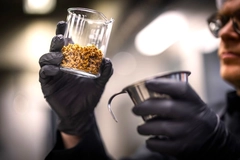
- Industry news
Industry news
- Category news
Category news
- Reports
- Key trends
- Multimedia
- Journal
- Events
- Suppliers
- Home
- Industry news
Industry news
- Category news
Category news
- Reports
- Key trends
- Multimedia
- Events
- Suppliers

12 Feb 2015 --- Campaigners for Origin of Meat labelling are celebrating today as the European government voted in favour of labelling all meat, processed and fresh with full country of origin information. The move would include all meat used in ready meals such as lasagne.
Monique Goyens, Director General of consumers rights campaign group BEUC, reacted: “We are delighted that the European Parliament seized a golden opportunity to support what 90% of EU consumers have been calling for - a more transparent meat supply chain. Their right to know where the meat in their burgers and sausages comes from has finally been acknowledged.”

They call on the European Commission, which published a report on the issue in late 2013, to come up with legislative proposals in order to rebuild consumer confidence in the wake of the horsemeat scandal and other food fraud cases.
The resolution, passed by 460 votes to 204 with 33 abstentions, urges the Commission to follow up its 2013 report with legislative proposals to make it mandatory to state the country of origin of meat used in processed foods, in order to ensure more transparency throughout the food chain, better inform European consumers and thus help rebuild their confidence.
"After the horse meat scandal, it is now up to us to regain consumers' trust. We are asking the Commission to come up with a legislative proposal with a mandatory country of origin labelling, because this will help to enhance transparency and to provide clear and complete information to the consumers”, said Environment Committee chair Giovanni La Via (EPP, IT).
“We must nonetheless ensure that this does not lead to additional burdens on small and medium-sized enterprises, of which there are many in this sector", he added.
MEPs reiterate their concern over the potential impact of food fraud on food safety, consumer confidence and health, the functioning of the food chain and farm produce prices.
MEPs point out that the European Commission’s report itself acknowledges that more than 90% of consumer respondents consider it important that meat origin should be labelled on processed food products. This is one of the several factors influencing consumer behaviour, MEPs say.
MEPs also point out that estimates of the impact on prices, based on the findings of a French consumer organisation, diverge widely from those in the Commission’s report, and ask for a clearer picture. The evaluation should be carried out in conjunction with consumer organisations and would not delay legislative proposals, they add.
Depending on the member state concerned, 30 to 50% of slaughtered meat is processed into meat ingredients for foodstuffs, mostly minced meat, meat preparations and meat products.
However, not everyone is as keen on the proposed legislation.Barbara Gallani, Director of the Regulation, Science and Health at the UK's Food and Drink Federation(FDF), told FoodIngredientsFirst that enough is being done in the industry already. She thinks that additional measures will place extra strain on manufacturers:
"Businesses in the UK food and drink supply chain have worked with Defra to develop voluntary principles on country of origin labelling which build on the current legislation and aim to provide even clearer labelling for consumers. Existing requirements in EU legislation ensure misleading statements on origin cannot be made and companies can and often do voluntarily provide information on the origin of products where it is feasible to do so and where there is consumer demand.
"Any extension to the legislation on Country of Origin Labelling would affect flexibility in the food supply chain which is vital to ensuring consistent supply of ingredients of appropriate quantity, quality and affordability. Provision of Country of Origin Labelling for meat as an ingredient is more complex than for fresh meat and the additional costs incurred, as shown by research, would place unwelcome strain on both business and household budgets," she said.










